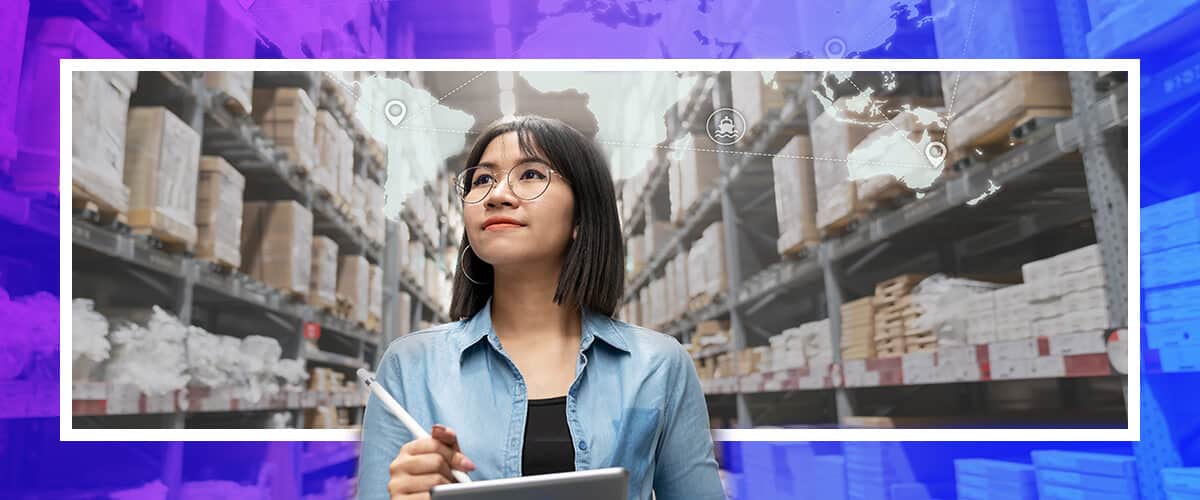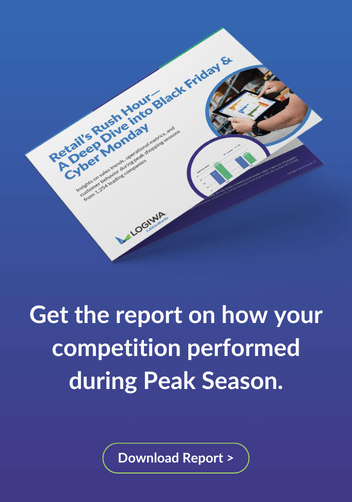With increasing consumer appetite for online shopping, global expansion is no longer a distant dream but a reality for modern-day ecommerce brands. However, international expansion can be hindered by shipping and fulfillment challenges such as navigating different customs regulations, managing logistics, and maintaining efficient supply chains across borders.
These challenges, stemming from burdensome international trade complexities and multi-level cross-border logistics, can overwhelm even the most ambitious e-retailers. Fortunately, there’s a way out — leveraging 3PLs and WMS software for global expansion.
Tech-driven third-party logistics providers offer established networks and use warehouse management systems to address global supply chain challenges while ensuring real-time visibility into operations. This allows online retailers to offload the complexities of global logistics and focus on what truly matters — expansion strategies. This article explores how 3PLs, with help from WMS software, power an ecommerce brand’s global expansion.
The role of 3PLs in global expansion
As experts in supply chain management, 3PLs have strategic partnerships with carriers, customs brokers, warehouse managers, and fulfillment tech providers like Logiwa. They often tap into these networks for their international ecommerce logistics needs.
For instance, 3PLs are often guaranteed transportation capacity, even for challenging routes or during peak seasons. This is due to longstanding relationships with trucking, shipping, and airlines. Their direct relationships with customs agents and brokers in different countries afford them a more seamless customs clearance process.
These factors allow ecommerce retailers to bypass the often time-consuming process of building these partnerships from scratch. Established 3PLs provide ecommerce brands immediate access to a global logistics ecosystem that streamlines their cross-region shipping and fulfillment operations.
This eases expansion into new markets as online retailers focus on more revenue-driving activities like product innovation and marketing, while 3PLs handle fulfillment. 3PLs provide various global supply chain solutions, as we discuss below.
Navigating complex regulations
International trade regulations are complex and vary between regions. In the US, trade regulations vary at the federal, state, and local levels, complicating compliance for overseas ecommerce brands trying to expand into the American market.
Established 3PLs have dedicated teams that are well-informed about cross-region trade regulations, import/export requirements, and customs procedures. These companies also train employees on emerging regulatory practices to keep them updated.
Additionally, 3PLs deal with different custom rules constantly. They interact regularly with key industry players, such as customs brokers, who keep them abreast of new regulations and requirements. This combination makes 3PLs deeply versed and efficient in navigating local and international trade regulations for their ecommerce partners.
Market entry support
3PLs boast proven knowledge of market dynamics, consumer preferences, and logistical nuances for different markets. They share their accumulated knowledge with potential clients looking to expand into new markets.
As such, 3PLs can advise e-retailers on the local cultural context to make their product presentations more relevant to the target markets. 3PLs also share insights into the competitive landscape in potential markets, which empowers ecommerce retailers seeking to expand to alternative markets.
Key services offered by 3PLs for ecommerce brands
Third-party logistics companies offer the following services to ecommerce brands.
Transportation and distribution solutions
3PLs partner with air, ocean, and ground freight transportation carriers. These partnerships allow them to design the most efficient cross-border logistics solutions for their ecommerce clients. For example, 3PLs can organize ocean freight for regular bulk shipments and simultaneously employ air freight when a retailer needs to replenish inventory to meet sudden demand spikes.
3PLs also coordinate efficient intermodal transitions to prevent delays, lost shipments, or in-transit product damages. And because they handle large shipping orders, 3PLs maximize economies of scale to secure favorable shipping rates for their clients. In essence, 3PLs offer online retailers seamless, cost-efficient transport and distribution solutions.
Customs and documentation
From commercial invoices, certificates of origin, and special permits, 3PLs fill and file all necessary customs documentation on behalf of ecommerce brands. They classify goods according to international custom codes and determine the correct valuation for duty purposes.
3PLs can advise and manage duty and tax payments. Some even offer deferred payment options, which afford small-to-medium-sized ecommerce brands seeking to expand cash flow flexibility. Furthermore, they track regulations and ensure online retailers comply with origin and destination custom regulations.
Risk management and contingency planning
The world of international trading is pretty volatile due to uncontrollable factors like political instability and natural calamities like the COVID-19 pandemic. That’s why reputable 3PLs offer risk management and contingency planning by:
- Developing comprehensive contingency plans for various scenarios to enable them to adjust accordingly and fulfill their delivery promises.
- Forming partnerships with carriers using different routes so they can quickly adapt to disruptions in specific areas or with particular partners.
- Using an advanced fulfillment management system (FMS) such as Logiwa IO to track shipments in real-time and respond promptly to any emerging issues.
The power of warehouse management systems (WMS) in supporting 3PL operations
Advanced warehouse management software enables 3PL companies to better serve ecommerce brands by supporting their operations in a variety of ways:
Efficient inventory management
Proper inventory management for ecommerce is vital to efficient order fulfillment, and advanced WMS gives 3PLs a critical edge in this process by:
- Automating SKU tracking: This allows 3PLs to eliminate the traditionally time-consuming, costly, and error-prone manual inventory tracking processes.
- Enabling proactive inventory management: Cutting-edge fulfillment systems like Logiwa IO feature AI-driven and machine-learning predictive capabilities that allow 3PLs to monitor inventory levels in real-time, helping brands avoid stockouts and overstocks.
- Automating restocking: Modern warehouse management systems automatically trigger replenishment based on predefined inventory levels and lead time. This streamlines restocking and ensures consistent product availability.
Ultimately, advanced WMS software streamlines inventory management for 3PLs, allowing the ecommerce brands they serve to better meet customer demands. This leads to higher satisfaction rates, improved brand appeal in new markets, and sustained growth in the competitive global marketplace.
Enhanced order fulfillment
As online shoppers’ preferences for shopping increase, so do their standards. A significant portion of online shoppers now expect a 2 – 3 day click-to-delivery rate. 3PL warehouse management systems allow 3PLs and their ecommerce clients to meet these demands. These systems enable 3PLs to maintain optimal stock levels through intelligent, real-time inventory management, hence preventing order delays caused by restocking issues.
Moreover, an AI-driven WMS software provides precise management of robotic picking systems for accurate, speedy product selection and packing for each order. This minimizes errors, prevents potential product damage, and speeds up order fulfillment processes.
WMS solutions like Logiwa incorporate integrated barcode scanners to collect and process product data during sorting. This enhances order accuracy and customer satisfaction, and eliminates costs associated with incorrect or defective order returns.
Logiwa’s innovative picking workflows separate orders by factors like identical SKUs. Automation also speeds packing of orders.
Data and analytics for improved decision-making
A WMS offers real-time inventory visibility across fulfillment centers, promoting data-driven supply chain decisions. For instance, with stock data from different locations, warehouse managers fulfill orders from the nearest distribution centers, which reduces shipping distances and costs.
Top WMS use AI algorithms to analyze historical sales data, current inventory levels, seasonal trends, and other relevant factors to predict future demand. Consequently, 3PLs adjust stock and labor resources accordingly to capitalize fully on the anticipated demand.
These systems even offer data to help with warehouse space optimization. For instance, Logiwa uses direct putaway algorithms to identify the best locations for inventory inside a warehouse. It allows 3PLs to organize inventory to improve order receiving and fulfillment processes.
3PL WMS ease global expansion for ecommerce brands
Tech-driven third-party logistics providers are invaluable allies for any ecommerce retailer seeking global success. 3PL companies facilitate customs and regulatory compliance flexibility as well as supply chain scalability. They also share valuable market insights and provide the technological infrastructure needed to thrive in the international trade space without steep costs.
If you’re ready to expand your ecommerce operations globally, consider partnering with a tech-driven 3PL powered by Logiwa IO.
Schedule a call today with a Logiwa fulfillment expert to discuss strategies for streamlining your international expansion plans and leveraging WMS technology to stay competitive in the global marketplace.
FAQs about ecommerce global expansion
How do 3PLs and WMS help ecommerce brands expand internationally?
WMS offers advanced inventory management tools and data-driven analytics that improve order fulfillment and optimization, thus enabling online retailers to meet customer expectations in new markets.
What key features should I look for in a WMS for global ecommerce?
Can WMS integration improve customer satisfaction for international orders?
What are the benefits of WMS for 3PLs?
• Enhanced inventory management for their ecommerce brand clients
• Seamless order fulfillment
• Better decision-making thanks to data-driven analytics





